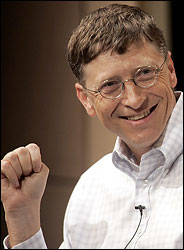REDMOND, Wash., July 28 - Microsoft's chief executive, Steven A. Ballmer, made a concerted effort Thursday to persuade financial analysts that the world's largest software publisher will again become a growth stock.
At Microsoft's annual briefing for analysts at its headquarters here, Mr. Ballmer sketched a portrait of the company's endeavors centered on "anchor businesses" - like its Windows operating systems for PC's and servers and its Office productivity software - that will continue to grow "robustly" through the end of the decade. He also pointed to growth potential in newer areas like Microsoft's video game business and software for mobile phones, interactive television and Web searching.
"We're not the kind of company that will get out here and make weird projections," he said in a morning talk that led off a series of management presentations on the company's businesses. "But I do know that the opportunity we have for growth is phenomenal."
Microsoft's top executives have become increasingly frustrated over the last five years as the company's stock first declined and then remained flat while some of its competitors' shares have soared.
Several analysts said Thursday that Microsoft would be hard pressed to make the case for growth prospects until it established a positive market reception for new versions of its Windows and Office programs, due in the second half of next year.
Microsoft shares have traded from $23.82 to $30.20 in the last year and closed Thursday at $25.75, up 3 cents.
Mr. Ballmer said he had had trouble selling the long-term value of Microsoft stock even to the company's own employees.
"Are you buying our stock?" he said he had asked a group of his executives, but there were no takers. "All the hands stayed down."
But he said the company was convinced that the stock was undervalued. Over the last 12 months Microsoft has bought back more than $8 billion worth of its stock, part of a four-year plan meant to buy back 10 percent of the market value, currently $275 billion, he said.
Mr. Ballmer, the company's chief booster, pointed out that since 2000, when the company was fighting a bitter federal antitrust case, it had actually increased its market share among the industry's top 25 information technology companies.
"We have won on the desktop and in business," he said.
From 2000 to 2005 Microsoft increased its share of industry operating income to 23 percent, from 18 percent.
To pick up the revenue pace, he said, Microsoft is planning "premium" versions of both Windows and Office, but he gave few details.
He also said Microsoft would continue to acquire relatively small companies to help it innovate, and would not rule out acquisitions as large as $2 billion.
On Wednesday, the company shipped the first public test copies of the next version of the Windows operating system, now known as Windows Vista, to outside software developers. The program, which is roughly three years late to market, by some estimates, will go through two long test programs before being commercially available in the second half of 2006.
On Thursday, Microsoft gave an extended demonstration of the program to the financial analysts, pointing to advantages like a unified version for corporate users - rather than multiple versions to address various needs within a company - simplifying the job of corporate information technology managers.
Many features shown Thursday are already in Apple Computer's OS X Tiger operating system.
During the morning briefing, Microsoft executives acknowledged that the popularity of Apple's iPod music player had indirectly helped sales of Macintosh computers.
"The halo effect enabled them to go after PC users and sell them Apple products," said Will Poole, the Microsoft executive in charge of desktop operating system products.
Thursday's meeting was the first in the 17 years of the event in which Bill Gates, Microsoft's co-founder and chairman, did not offer an overall vision of the company's business strategy. Instead, he took part in an onstage interview with his chief technology officer, Ray Ozzie, and a University of Washington computer scientist, Ed Lazowska.
The company said Mr. Gates had decided on an informal format as a way to talk about a broad range of industry trends.
Google Hiring Blocked
By Bloomberg News
Google's plan to open a research center in China was disrupted yesterday in Seattle, where a state judge temporarily blocked the company from hiring a former Microsoft executive to head the facility.
Judge Steven Gonzalez issued a temporary restraining order barring the former Microsoft vice president, Kai-Fu Lee, from working on competing projects at Google.









